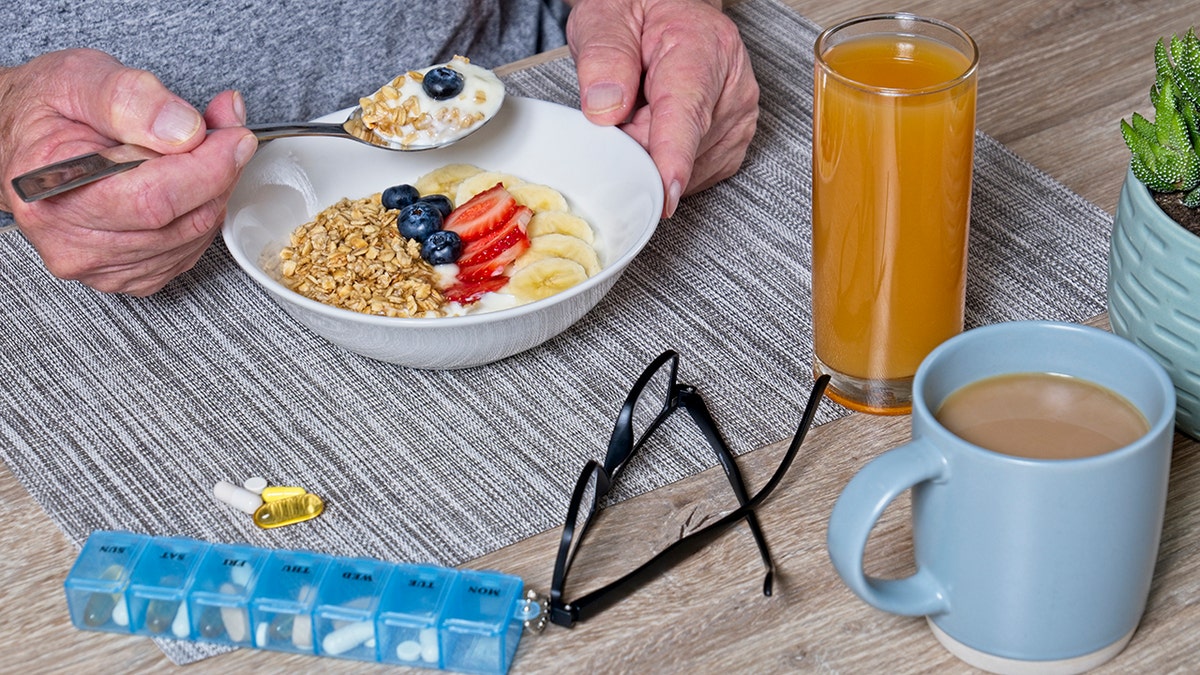Breakfast timing may hold the key to living longer, new research reveals

NEWYou can now listen to Fox News articles!
Eating breakfast earlier in the day may help add years to your life, new research suggests.
A decades-long study tracking nearly 3,000 adults over the course of about 30 years found that the timing of meals, especially breakfast, may be just as important as what is on the plate and could signal underlying health problems.
An international team, led by Dr. Hassan Dashti of Massachusetts General Hospital and Harvard Medical School, analyzed meal times, health conditions, genetics and mortality of the 42- to 94-year-olds using data from the University of Manchester.
SKIPPING BREAKFAST AND EATING DINNER LATE LINKED TO SURPRISING BONE HEALTH RISK
The findings, published this month in the journal Communications Medicine, showed that as people age, they tend to eat breakfast and dinner later, shift their eating midpoint — the halfway point between the first and last meal of the day — and shorten their overall eating window.
Breakfast and dinner times are likely to shift later due to factors such as poor sleep, depression, dental problems, difficulty preparing meals and lifestyle changes like retiring, living alone or moving into assisted living facilities.
“For example, depression and fatigue may reduce appetite or slow down morning routines, while dental or chewing problems can make eating uncomfortable, leading people to postpone breakfast,” Dashti told Every Day Health.
HIDDEN SLEEP DANGER COULD INCREASE RISK OF 172 DISEASES, MAJOR STUDY REVEALS
Because the study was observational, the researchers cannot say for sure that these health issues cause later breakfasts, only that they often occur together, he added.
On average, every decade of aging was linked to an eight-minute delay in breakfast and a four-minute delay in dinner, the scientists found. Over 22 years of follow-up, researchers recorded 2,361 deaths among participants. Each additional hour delay in breakfast time was tied to a higher risk of death.

Older adults who stuck to earlier meals were more likely to live longer, with a 10-year survival rate of 89.5% compared to 86.7% among late eaters.
MORNING WORKOUTS CAN BOOST WEIGHT LOSS IF ONE KEY HABIT IS FOLLOWED, EXPERTS SAY
“The difference was statistically significant, but it was modest,” Dashti noted.
Physical and psychological illnesses including depression, anxiety, fatigue and oral health issues were also tied to later eating.
“Our findings suggest that later meal timing, especially breakfast, could serve as a simple marker of health in older adults and may guide future strategies for healthy aging,” the researchers wrote.
MORE FROM FOX NEWS LIFESTYLE
The study adds weight to the growing field of “chrononutrition,” which examines how meal timing affects health, and suggests that circadian rhythms and eating schedules may be central to healthy aging.

“Up until now, we had a limited insight into how the timing of meals evolves later in life and how this shift relates to overall health and longevity,” Dashti said.
“These results add new meaning to the saying that ‘breakfast is the most important meal of the day,’ especially for older individuals,” he added.
Dashti noted that the findings are especially important as intermittent fasting and time-restricted eating trends are becoming more popular, and could affect older adults differently than younger ones.
Consistent eating patterns may help maintain healthy body rhythms that support aging and longevity, the experts said. Dashti recommends that older adults follow a regular meal schedule as part of broader strategies to promote healthy aging and longer life.
Read the full article here









